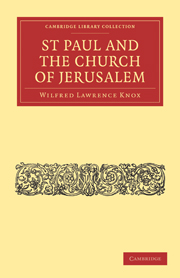Book contents
- Frontmatter
- PREFACE
- Contents
- INTRODUCTION
- Chapter I THE CHURCH OF JERUSALEM
- Chapter II STEPHEN AND SAUL
- Chapter III THE FIRST EXTENSION OF THE CHURCH
- Chapter IV THE ENTRANCE OF THE GENTILES
- Chapter V THE CHURCH AT ANTIOCH
- Chapter VI THE APPEAL TO THE WORLD
- Chapter VII THE COLLECTION FOR THE SAINTS
- Chapter VIII THE END OF THE JOURNEYS
- INDEX
Chapter II - STEPHEN AND SAUL
Published online by Cambridge University Press: 13 June 2011
- Frontmatter
- PREFACE
- Contents
- INTRODUCTION
- Chapter I THE CHURCH OF JERUSALEM
- Chapter II STEPHEN AND SAUL
- Chapter III THE FIRST EXTENSION OF THE CHURCH
- Chapter IV THE ENTRANCE OF THE GENTILES
- Chapter V THE CHURCH AT ANTIOCH
- Chapter VI THE APPEAL TO THE WORLD
- Chapter VII THE COLLECTION FOR THE SAINTS
- Chapter VIII THE END OF THE JOURNEYS
- INDEX
Summary
The first serious internal difficulty of the new sect of Judaism arose from its attempt to combine the functions of a religious movement and a social organization. The growth of numbers and the waning of the first flush of enthusiasm were bound to lead inevitably to the development of a more natural and less enthusiastic atmosphere, in which grievances and dissensions could make themselves felt. Naturally the attempt to preserve a complete equality of possessions among all the members multiplied the opportunities for grievances. Moreover the Christian body was not a homogeneous whole. The Hellenist Jews of Jerusalem were marked off from their Hebrew brethren by the fact that they possessed synagogues of their own, in which, as in the synagogues of the Dispersion, worship was conducted in the Greek tongue; many Hellenists spoke no other language. They were thus to a considerable extent cut off from their Hebrew brethren, who naturally tended to look down on those who had been born in strange lands. The Jews of the Dispersion were suspected, not without some justification, of laxity in the observance of the Law; and in any case the mere fact of the Hellenists' return to Palestine was a confession of their inferiority to the native Hebrew. Among them too were proselytes, who were admittedly inferior to the seed of Abraham.
It was therefore easy for the Hellenist Christian to feel himself slighted by his Hebrew brethren, whether a slight were intended or not.
- Type
- Chapter
- Information
- St Paul and the Church of Jerusalem , pp. 39 - 65Publisher: Cambridge University PressPrint publication year: 2010First published in: 1925

